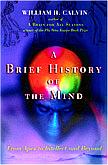"The climate doctors have been consulted; the lab reports have come back. Now it’s time to pull together the Big Picture and discuss treatment options."
|
HOME |
William H. Calvin
|
|
Global Fever
(The University of Chicago Press, 2008) ISBN 0226092046 US$22.50 cloth
2. We’re Not in Kansas Anymore 3. Will This Overheated Frog Move? 8. What Makes a Cycle Vicious? 10. Slip Locally, Crash Globally 12. Methane is the Double Threat 14. A Sea of CO2 21. Get It Right on the First Try
Interviews and such: www.evolutionshift.com/blog/2007/07/12/leading-scientists-and-thinkers-on-energy-william-calvin/
Read Widely Five books set the stage effectively. Jared Diamond, Al Gore, An Inconvenient Truth. Rodale Press, 2006. Closely follows the world-famous film that won an Oscar. Robert Henson, The Rough Guide to Climate Change: The Symptoms. The Science. The Solutions. 2006. It’s one of the best of the reader-friendly books that could also be used for a climate course. Mark Lynas, Six Degrees. Fourth Estate HarperCollins, 2007. His chapter on the consequences of a one degree fever is sobering enough, but then he works his way through the consequences of higher ones; the book’s title refers to the sixth such chapter. A six degree fever is what’s forecast for a business-as-usual scenario. His book is very well done and a remarkable achievement for a nonscientist. It shows that with a first-class honours degree in history and politics, you can read and understand much of climate science. Joseph J. Romm, Hell and High Water (William Morrow, 2007). An excellent book of climate science, science policy, and informed advocacy. The author is a physicist and oceanographer by training, formerly Acting Assistant Secretary in the U.S. Department of Energy in the Clinton administration. His take on the climate science and the energy options is especially valuable because of that background. He also writes well (that his father was a journalist might have something to do with it). Then consider reading these books: Brian Fagan, The Long Summer: how climate changed civilization, Basic Books, 2004. Tim Flannery, The weather makers. Atlantic Monthly Press, 2005. Ross Gelbspan, Boiling point. Basic Books, 2004. Elizabeth Kolbert, Field notes from a catastrophe. Bloomsbury, 2006. Eugene Linden, The Winds of Change. Simon & Schuster, 2006. James Lovelock, The Revenge of Gaia. Penguin, 2006. Mark Lynas, High Tide. Picador, 2004. George Monbiot, Heat: how to stop the planet burning. Penguin/Allen Lane, UK, 2006. Fred Pearce, The Last Generation: how nature will take her revenge for climate change. Eden Project Books, UK, 2006. Phillip W. Schewe. The Grid. Joseph Henry Press , Washington DC, 2007. A. Barrie Pittock, Climate change: turning up the heat. CSIRO, Australia, 2005. On the web, try RealClimate.org, done by real climate scientists, Society for Environmental Journalism at www.sej.org/resource/index18.htm. Professor Stephen Schneider’s climate website, stephenschneider.stanford.edu American Institute of Physics, www.aip.org/history/climate/links.htm Pew Center on Climate Change, www.PewClimate.org Climate Institute at Climate.org, Union of Concerned Scientists at ClimateChoices.org. Rocky Mountain Institute at www.rmi.org. World Resources Institute, at wri.org. Navigating Numbers is excellent. BBC’s updated climate pages at www.bbc.co.uk/sn/hottopics/climatechange/ New York Times at topics.nytimes.com/top/news/science/topics/globalwarming/index.html?8qa. American Association for the Advancement of Science at http://www.aaas.org/climate/ Copyright 2008 by William H. Calvin |
For the Amazon.com link, click on a cover. Almost Us, 2005 A Brief History of the Mind, 2004 A Brain for All Seasons 2002 Lingua ex Machina 2000 The Cerebral Code 1996 How Brains Think 1996
And more at WilliamCalvin.com |
Climate Videos

















